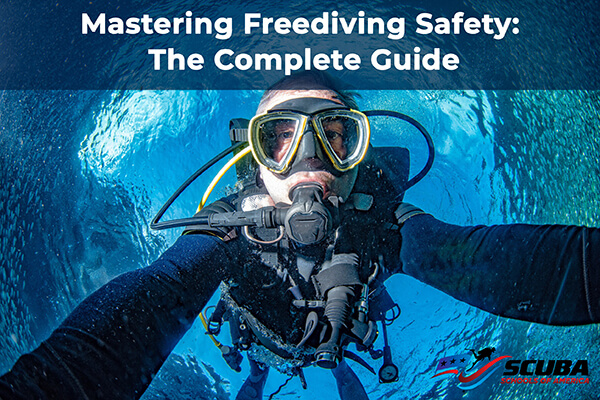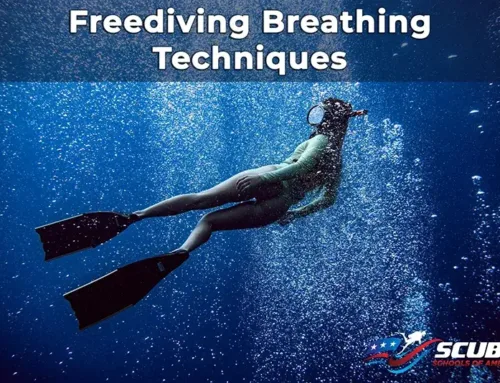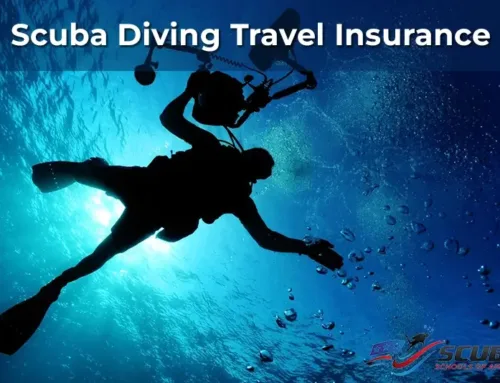Introduction: Mastering Freediving Safety
Many people who have never tried freediving often perceive it as a dangerous activity. This perception, however, is largely based on misconceptions rather than facts. While freediving may seem like an extreme sport due to its association with deep dives and prolonged breath-holding, it is statistically one of the safest “extreme” sports.
In fact, there has only been one recorded death in freediving competitions out of approximately 80,000 competitive freedives worldwide. This remarkable statistic highlights how safe freediving can be when approached with proper training and adherence to safety protocols.
When you learn about freediving through Scuba Schools of America, you receive comprehensive instruction on safety techniques that significantly reduce any risks associated with the sport. These schools are committed to teaching divers the correct methods and protocols to ensure that every dive is both enjoyable and safe.
By following the established freediving safety rules, divers can eliminate much of the danger and fully appreciate the sport’s numerous benefits.
Freediving Safety: Understanding Potential Injuries and Risks
Freediving is generally safe, but like any sport, it comes with certain risks that divers should be aware of. Below are some of the main risks associated with freediving and tips on how to prevent them:
Middle Ear Barotrauma
The middle ear is surrounded by rigid structures, with the eardrum being the only flexible part. As you dive deeper and the surrounding pressure increases, the eardrum bows inward to reduce the volume of the middle ear. However, once the eardrum has stretched to its limit, it cannot reduce the volume further. If you continue to descend without equalizing, the pressure inside the middle ear remains lower than the external pressure, leading to potential injury.
The Eustachian tube, which connects the middle ear to the nasal cavity, is the only pathway to equalize this pressure. Normally, the Eustachian tubes are closed but open momentarily when we swallow or yawn, allowing pressure to equalize. Freediving challenges this process, and failure to equalize can result in middle ear barotrauma, which may cause lasting damage.
Prevention of middle ear barotrauma
- Avoid diving when congested.
- Do not dive if you experience popping, crackling, or a sensation of fullness in your ears after diving.
- Learn and practice proper equalization techniques.
By being mindful of these risks and taking appropriate precautions, you can enjoy freediving safely.
Loss of Motor Control (LMC)
Loss of Motor Control (LMC) can happen when oxygen levels drop too low during breath-holding. LMC is a form of hypoxia that, while less severe than full loss of consciousness, still disrupts normal bodily functions. During an LMC episode, the diver remains conscious or semi-conscious, but the lack of sufficient oxygen affects motor control.
This often results in visible signs such as jerky or interrupted movements, especially in the head, chin, or eyes. The symptoms can vary, ranging from more noticeable shaking of the head or unfocused eyes to subtle signs like a twitching hand or foot.
How to Avoid LMC
- Progress gradually when increasing the depth of your dives.
- Avoid pushing your limits and know when to stop.
By taking these precautions, you can reduce the risk of experiencing LMC while freediving.
Shallow Water Blackouts
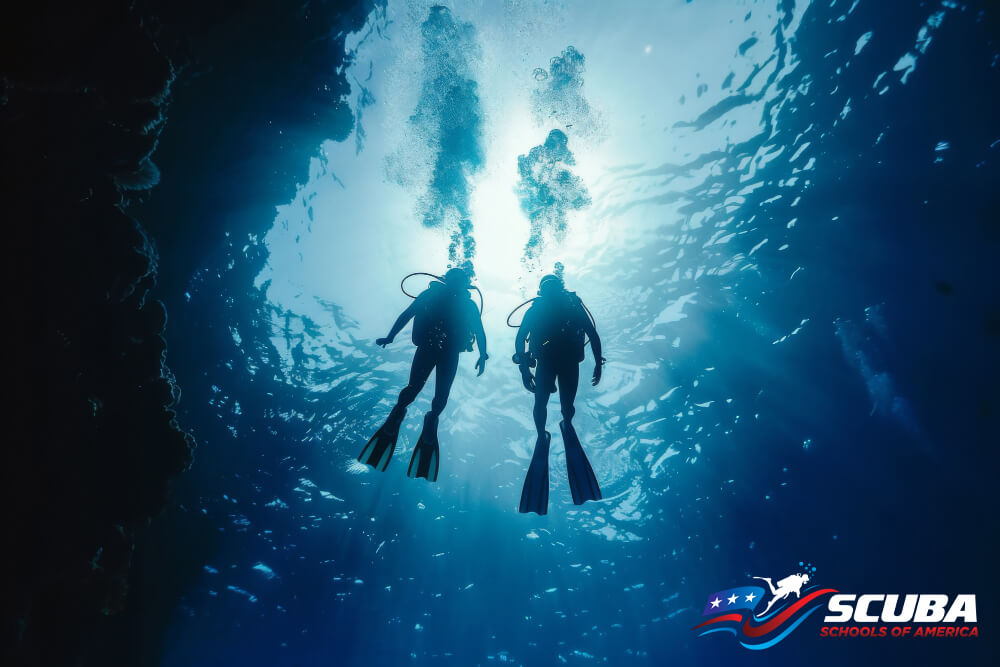
Shallow Water Blackouts (SWBs), also known as hypoxic blackouts, have tragically turned many aquatic activities from enjoyable to perilous. This silent threat hides beneath the water’s surface, endangering even those in shallow depths. But what exactly are shallow water blackouts and how do they occur?
SWBs arise under various oxygen (O2) and carbon dioxide (CO2) conditions in the body before breath-holding. These conditions include low CO2, low O2, normal levels of both, or low levels of both during competitive situations.
Hyperventilation before breath-holding intensifies the risk by reducing circulating CO2, which suppresses the urge to breathe and prompts individuals to hold their breath longer than safe. Changes in underwater pressure in deeper waters can also contribute to blackouts. Additionally, fatal outcomes can result from larynx spasms, fatal cardiac arrhythmias, or seizures induced by oxygen deficiency.
SWBs result in severe oxygen deprivation to the brain, posing significant dangers to swimmers practicing breath-holding underwater. In essence, a shallow water blackout occurs when the brain receives insufficient oxygen to function properly.
The risk of blackouts is a major concern in freediving safety education. Oxygen deprivation from breath-holding can lead to blackouts akin to fainting, both underwater and at the surface. If a diver blacks out underwater, their buddy should secure their airway and safely bring them to the surface. Typically, the diver regains consciousness on their own at the surface or with simple stimulation.
Prevent shallow water blackout
To avoid SWBs, it’s crucial to progress slowly when increasing dive depths and never exceed personal limits. Diving within these limits minimizes the risk of experiencing a blackout.
Where Do Shallow Water Blackouts Occur?
SWBs primarily occur in settings where people engage in breath-hold diving, particularly in swimming pools. While associated with deep free dives and scuba diving using rebreathers or open-circuit equipment, the prevalence of SWBs in swimming pools highlights a widespread concern. Raising public awareness and implementing preventive measures, especially in public pool settings, are vital steps to reduce the incidence of this potentially fatal condition.
Decompression Sickness (DCS)
Decompression sickness, also known as generalized barotrauma or “the bends,” is a condition caused by a rapid decrease in the pressure around you, whether in air or water. It most commonly affects scuba or deep-sea divers but can also occur during high-altitude flights or unpressurized air travel.
When scuba diving, you breathe compressed air, which introduces extra oxygen and nitrogen into your body. While your body uses the oxygen, the nitrogen dissolves into your blood and stays there during the dive. As you ascend toward the surface, the water pressure decreases.
If this ascent happens too quickly, the nitrogen doesn’t have enough time to exit your bloodstream naturally. Instead, it forms bubbles in your blood and tissues. These nitrogen bubbles are the cause of decompression sickness. The condition is called “the bends” because the intense joint and bone pain it causes can force you to bend over in agony.
This process is similar to what happens when you open a carbonated drink. As the pressure inside the container decreases, gas comes out of the liquid in the form of bubbles. Similarly, nitrogen bubbles in your bloodstream can damage blood vessels and block normal circulation.
Prevention of Decompression Sickness
To reduce the risk of decompression sickness while diving:
- Ascend slowly and avoid staying at your deepest depth longer than recommended. Scuba divers use dive tables that show safe limits for time and depth.
- Do not fly within 24 hours of diving.
- Avoid drinking alcohol before diving.
- Steer clear of hot tubs, saunas, or hot baths after diving.
- Ensure you’re well-hydrated, well-rested, and prepared before diving. If you’ve recently had a serious illness, injury, or surgery, consult your doctor before diving.
These precautions can help ensure a safe and enjoyable diving experience.
Mask Squeeze
Mask squeeze is a common issue for new divers, caused when the pressure inside your mask isn’t equalized during a dive. This creates a vacuum effect, which pulls on your eyes and the surrounding soft tissue. While mask squeeze may look alarming, it’s mostly superficial and not serious.
New divers often experience mask squeeze because they’re focused on other aspects of the dive and may not notice the pressure building. To prevent mask squeeze, it’s essential to keep your nasal passages open while diving.
Exhaling through your nose helps equalize the pressure and reduces the risk of bruising or barotrauma, especially if you have a properly fitting mask.
The fit of your mask is crucial in avoiding mask squeeze. A well-fitting mask should rest snugly against your face and create a seal when you inhale through your nose, even without the strap-on. If your mask doesn’t seal properly, it’s not the right fit, and you’ll need to find one that suits your face better.
By ensuring a good fit and remembering to equalize pressure, you can avoid mask squeeze and enjoy a safer, more comfortable dive.
Trachea Squeeze
Lung or trachea squeeze is primarily a concern for competitive freedivers. It occurs during deep dives when the increased pressure compresses a lung full of air to less than its residual volume, which is the amount of air left in the lungs after a full exhalation.
As the diver descends, the volume of air in the lungs becomes smaller than the residual volume, creating negative pressure in the lungs and trachea. This can lead to tears in the lung or trachea tissues or cause blood vessels to burst.
A diver experiencing a squeeze may surface coughing up blood, though in some cases, the blood may be minimal or even absent. However, there will likely be noticeable discomfort and shortness of breath.
How to avoid getting trachea squeeze
To reduce the risk of lung or trachea squeeze, avoid excessive neck stretching or looking upwards during dives. Staying mindful of proper body positioning can help prevent this condition and ensure a safer diving experience.
Lung Squeeze
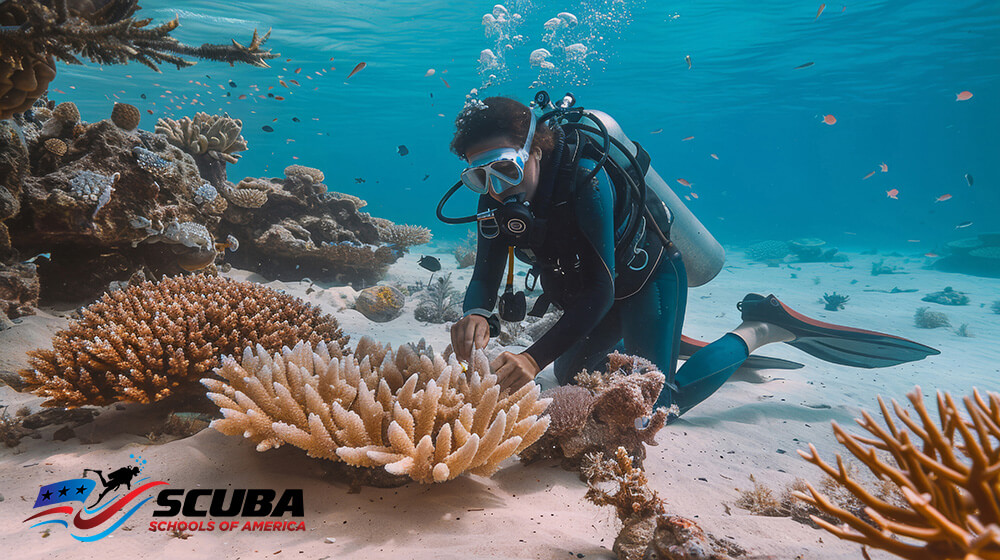
Lung barotrauma, or lung squeeze, is a serious condition caused by pressure on the lung’s air spaces during freediving, particularly at depths greater than 30 meters (100 feet). Symptoms include shortness of breath, coughing, dizziness, fatigue, and coughing up pink, foamy blood. While the severity can vary, it can potentially be life-threatening, although this is extremely rare.
Avoid Lung Squeeze
Always dive within your comfort zone and increase depth gradually. This allows your body to adjust to the increased pressure as you dive deeper.
Pre-Existing Medical Conditions
Pre-existing medical conditions affecting the lungs or heart, as well as certain medications, can pose serious risks during freediving. This is a critical consideration for freediving safety. Before enrolling in a freediving course, you will need to complete a medical questionnaire to assess your current health.
Prevention
If you have any condition that could impact your safety in the water, consult a physician before freediving to ensure you are fit to dive.
Weather and marine life/debris
Environmental factors are key to freediving safety. Strong winds, waves, or thunderstorms can create hazardous conditions. Other risks include discarded fishing gear, debris from boats, and dangerous marine environments.
Prevention
Freedive in areas that are clear of rocks, boats, and other hazards and ensure easy access to the shore. Choose calm days and safe locations, and avoid touching marine life or debris.
Benefits of Freediving Safety
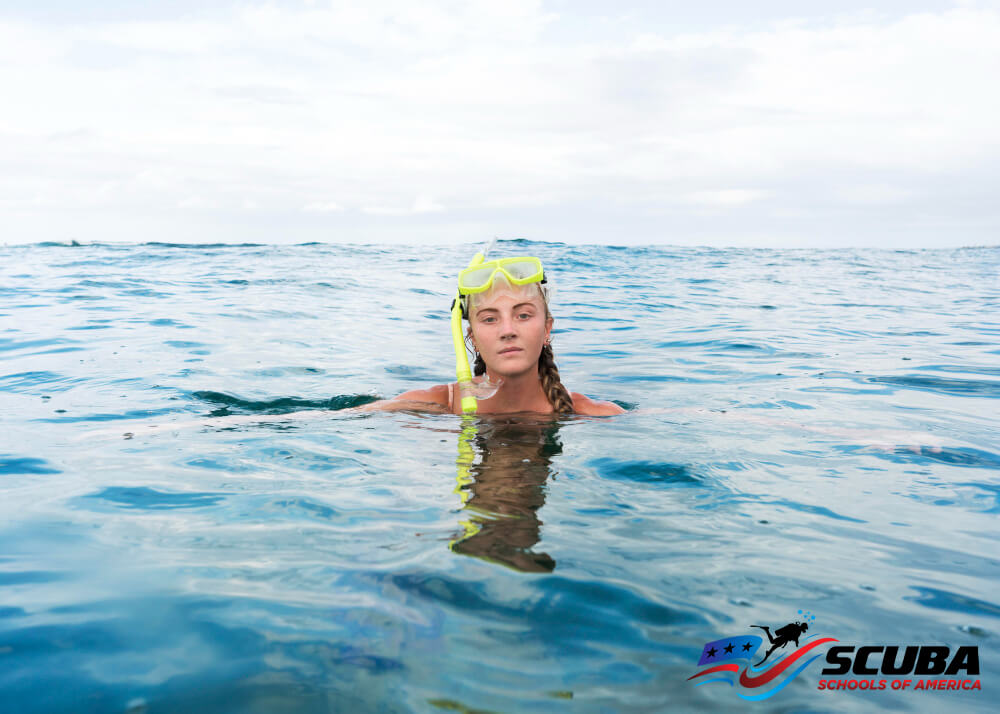
After addressing common safety concerns and risks, let’s explore the many benefits that freediving offers. Here are some of the key advantages:
Health Benefits of Freediving:
1. Improved Lung Capacity
Freediving involves mastering controlled breathing techniques, which can gradually expand lung capacity. With regular training, divers can significantly extend the duration they can hold their breath, leading to more efficient respiratory function.
2. Enhanced Cardiovascular Health
Freediving provides a great workout for the cardiovascular system. As divers descend and ascend, the heart rate adjusts to meet the body’s oxygen needs. This helps improve cardiovascular endurance and promotes overall heart health.
3. Increased Strength and Flexibility
Freediving engages multiple muscle groups, especially in the core, legs, and arms. The constant movement required—like kicking and pulling against water resistance—helps tone and strengthen muscles. Additionally, the flexibility needed for efficient diving can improve overall body flexibility.
Mental Benefits of Freediving:
1. Enhanced Mental Discipline
Freediving requires mental focus and discipline, as divers must stay calm and concentrated, trusting their skills underwater. This mental strength not only improves diving safety but also enhances decision-making and self-awareness in daily life.
2. Increased Confidence
Conquering personal challenges and pushing physical boundaries underwater boosts confidence. As divers achieve new depths, they develop a sense of accomplishment that translates into greater self-esteem.
3. Stress Relief
Freediving’s relaxation techniques, such as controlled breathing and breath-holding, help reduce stress and anxiety. The peaceful underwater environment promotes mindfulness, allowing divers to disconnect from everyday pressures and experience tranquility.
Spiritual Benefits of Freediving:
1. Connection with Nature
Freediving offers an immersive experience in the beauty of the underwater world, fostering a deep connection with nature. This close interaction with the marine environment often inspires a sense of responsibility to protect and conserve the ocean.
2. Spiritual Growth
Many freedivers describe their underwater experiences as spiritually transformative. The feeling of unity with the ocean and its creatures often leads to moments of introspection, fostering spiritual growth and a sense of enlightenment.
Freediving offers a combination of physical, mental, and spiritual rewards, making it a uniquely fulfilling activity.
Learn to Freedive Safety with Scuba Schools of America
At Scuba Schools of America, the SSI Freediver program teaches you how to enjoy freediving while staying safe. You’ll gain a deep understanding of freediving safety, learning essential techniques to advance in the sport responsibly.
Additionally, you’ll be trained to ensure the safety of fellow freedivers, equipping you with the skills to assist others when needed. With Scuba Schools of America, you’ll build the confidence to explore the underwater world with peace of mind.
Give one of our certified Scuba Schools of America instructors a phone call in Montclair, CA.

